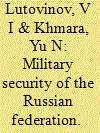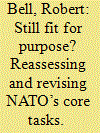| Srl | Item |
| 1 |
ID:
152824


|
|
|
|
|
| Summary/Abstract |
This paper examines issues of science-and-technology security, defense capability provision, and high-tech military and civilian economic growth in Russia. It argues for a need to quantitatively and qualitatively assess science-and-technology standards and devise measures of building up a science-and-technology buffer stock in breakthrough areas.
|
|
|
|
|
|
|
|
|
|
|
|
|
|
|
|
| 2 |
ID:
145834


|
|
|
|
|
| Summary/Abstract |
The authors examine the conceptual foundations of military security of the state as a necessary component of its functioning. They analyze the genesis of the Russian vision of military security problems in the post-Soviet period, especially in modern conditions. They also outline methodological approaches to determining the strategy of the Russian Federation's military security in the context of changing priorities for ensuring it amid the aggravation of the military and political situation in the world and around Russia.
|
|
|
|
|
|
|
|
|
|
|
|
|
|
|
|
| 3 |
ID:
186544


|
|
|
|
|
| Summary/Abstract |
NATO’s 2010 Strategic Concept established three core tasks for the Alliance: collective defense, crisis management, and cooperative security. While those tasks remain sound, the 2010 Concept reflected a different geopolitical, geostrategic, and security environment from today’s, characterized by renewed conflict with Russia, concerns about China’s strategic and economic ambitions, and new security challenges like hybrid threats and disinformation. Considering the changed strategic landscape and emerging challenges, we argue that NATO should make several refinements to its core tasks. European Allies must improve defense capabilities, ensuring their ability to help NATO meet its core tasks. In conjunction with the other Allied nuclear powers (the United Kingdom and France), the U.S. must renew its commitment to maintaining NATO as a nuclear alliance. NATO should adopt a more rigorous operational definition of crisis management, and a more systematic emphasis on the early warning and pre-crisis phases. Finally, while national “resilience” is already implied in Article 3ʹs requirement for member states to “maintain and develop their individual and collective capacity to resist armed attack,” adding it as a fourth core task would powerfully emphasize the need for allies to address new elements of resilience, to include both technological threats and democratic backsliding.
|
|
|
|
|
|
|
|
|
|
|
|
|
|
|
|